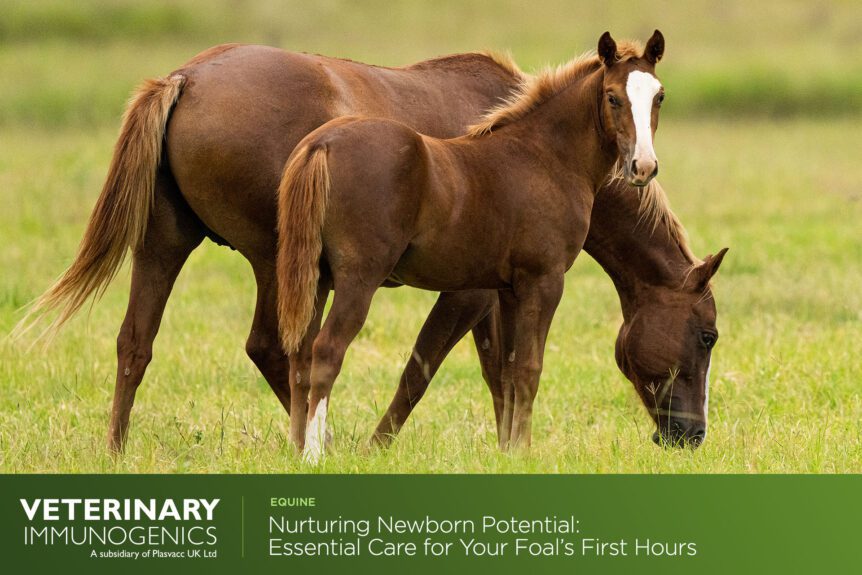The arrival of a newborn foal is a moment of wonder and excitement for horse owners and breeders. The initial 24-48 hours after birth are incredibly vital for setting the stage for the foal’s growth and wellbeing. During this brief but crucial period, your foal requires special care and attention to ensure a smooth transition into the world. Read on for helpful advice from Veterinary Immunogenics’ expert consulting veterinarians to help you navigate the first 24 hours after your foal’s birth with confidence and care.
Immediate Bonding
In the first moments after birth, it’s important to allow the mare and foal to bond naturally. This early interaction fosters a strong emotional connection, which helps the foal feel secure and will allow for the foal to begin nursing as soon as it’s able—one of the most important tasks facing a newborn.
Umbilical Care
Keep the foal’s umbilical stump clean and dry to prevent infections. Gently disinfect the stump with an antiseptic solution, following the guidance of your veterinarian. It’s always a good idea to keep the placenta on hand so that it’s available for analysis by your veterinarian in the event of complications post-foaling.
Colostrum Intake
Ensuring the foal receives colostrum in the first few hours after birth is paramount to the foal’s health and one of the most important things to monitor as an owner or breeder. Produced in the mare’s udder during the last two to four weeks of gestation in response to hormonal changes, colostrum contains concentrated immunoglobulins, or antibodies, from the mare’s serum. These essential antibodies provide immunity to a wide range of pathogens, while colostrum also provides vital nutrients necessary for the foal’s health.
It is important for the foal to ingest the colostrum as soon as possible after standing. Healthy foals will nurse roughly every 30 minutes, with the suckle reflex beginning approximately 20 minutes after birth and becoming stronger and stronger with time. Failure or inability to suckle is the first sign of a neonatal problem.
The absence of or low production of colostrum, or loss of colostrum in mares that drip milk prior to foaling, will result in failure of passive transfer of immunity and predispose the foal to neonatal septicaemia and other health concerns as it ages.
If needed, you can assist nursing by gently guiding the foal towards the udder, ensuring it receives the vital colostrum.
Observation / Vet Check
Closely monitor the foal’s behaviour, breathing, and overall demeanour. Look for signs of weakness or difficulty in standing, as these could be indicators of potential health issues.
A routine evaluation by your veterinarian should be carried out within 12-24 hours of birth. This should include close observation, a physical examination, and an assessment of maturity and passive transfer of maternal immunity.
If transfer of maternal immunity is in question, a vet can administer hyperimmunised supplemental plasma such as HYPERMUNE in order to ensure the foal is equipped with the necessary immunity to protect against common pathogens and disease.
Temperature Regulation
Foals have limited ability to regulate their body temperature in the first few days of life, especially within their first few hours. Provide a warm and sheltered environment to prevent chilling, especially if the weather is cold.
A cold foal will stress its body trying to keep warm, which can result in undue calorie burn as it tries to keep its core temperature up. This can cause the foal to become lethargic, lessening its ability to nurse and absorb vitally important calories.
Conversely, if a foal is brought into an excessively hot environment, it is quite susceptible to hyperthermia, as newborn foals are not able to regulate body temperature via sweating until 2-6 weeks of age. Unable to sweat, foals will begin to hyperventilate, expending unnecessary energy that can lead to a failure to nurse properly as well as cause dehydration.
Hydration
In addition to colostrum, make sure the foal receives adequate hydration via consistent nursing. As foals don’t usually begin drinking water until reaching 3 weeks of age, it’s important to monitor the foal’s hydration levels and ensure the mare is producing adequate milk supply. A veterinarian can recommend electrolyte supplements if necessary.
Rest and Quiet
Provide a calm and peaceful environment for the foal’s first hours. Minimise disturbances to allow the foal to rest and recover from the birthing process.
Record Keeping
Document the foal’s birth time, weight, and any significant observations during the first 24 hours. This information will be helpful for tracking the foal’s progress and discussing its health with the veterinarian.
Summary
The first 24 hours of a foal’s life are a fleeting but monumental period that lays the groundwork for its future wellbeing. By focusing on immediate bonding, colostrum intake, careful observation, essential veterinary care, and immunity-boosting treatments such as HYPERMUNE™ you can ensure your newborn foal’s healthy start. Remember that every foal is unique, so trust your instincts while seeking guidance from experienced breeders and veterinarians. With attentive care and patience, you’re providing your foal with the best possible beginning on its journey through life.

